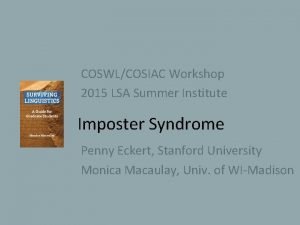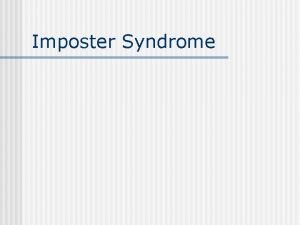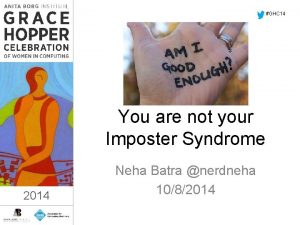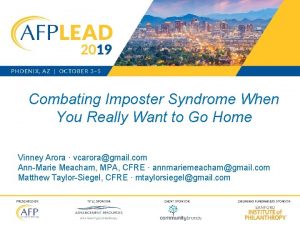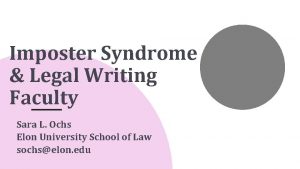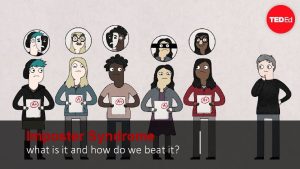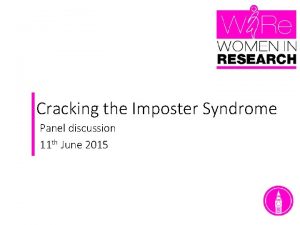COSWLCOSIAC Workshop 2015 LSA Summer Institute Imposter Syndrome
























- Slides: 24

COSWL/COSIAC Workshop 2015 LSA Summer Institute Imposter Syndrome Penny Eckert, Stanford University Monica Macaulay, Univ. of WI-Madison

“The trouble with the world is that the stupid are cocksure and the intelligent are full of doubt. ” (Bertrand Russell)

A definition “Imposter syndrome can be defined as a collection of feelings of inadequacy that persist even in face of information that indicates that the opposite is true. It is experienced internally as chronic self-doubt, and feelings of intellectual fraudulence. ” https: //counseling. caltech. edu/general/Infoand. Resources/Impostor

Symptoms • • attributing success to luck discounting success feeling like a fake dreading that people will find out you aren’t as talented as they think you are or as you should be.

“It can be hard to tell when you’ve got it: those others might have a syndrome, your reasoning goes, but I’m genuinely out of my depth. It’s a classic case of “comparing your insides with other people’s outsides”: you have access only to your own self-doubt, so you mistakenly conclude it’s more justified than anyone else’s. ” http: //www. theguardian. com/lifeandstyle/2013/nov/09/impost or-syndrome-oliver-burkeman

Who gets it? • High-achievers • Different professions, e. g. – teachers – people in academia – actors – athletes –. . .







Closer to home “Catherine Cardelús, an assistant professor in biology …, first noticed the phenomenon as a graduate student … ‘I was thinking, ‘I’m not cut out for this. I really can’t do this’ -- even though there was ample evidence to the contrary, ’ she remembers. And the negative, self-sabotaging thoughts didn’t stop, they continued through her postdoc and into her full-time positions. ‘I’m a high achiever and I’m successful, but I’ve had those moments of waiting for someone to tap me on the shoulder and tell me I don’t belong, ’ she says. ‘Or to tell me I was really lucky to get that paper in that journal. ’ Cardelús has discussed the issue at international science conferences. ‘It’s pervasive, ” she says. “Absolutely pervasive. ’” http: //www. nature. com/naturejobs/science/articles/10. 1038/nj 7245 -468 a

Is it all bad? Can you put it to good use?



Once again – who gets it? • People in disenfranchised social categories? – Women, underserved minorities, first generation academics. . . Or do different groups have different ways of dealing with it? • Who doesn’t get it? • Who doesn’t own up to it?

• “Impostor syndrome. . . is presumably even more common than surveys suggest: after all, it’s not the kind of thing to which people like to admit” http: //www. theguardian. com/lifeandstyle/2013/nov/09/impost or-syndrome-oliver-burkeman • “When psychologists first began to study the impostor phenomenon, they suspected it was something experienced primarily by women. That has proven not to be the case. In fact, it is one of the few psychological issues initially thought to affect primarily women that later was determined to relate to both genders. ” http: //www. impostorsyndrome. com/book/what-about-men/

Okay, so what can you do? Think of confidence as a skill you need to develop. • Start by recognizing that you aren’t the only “imposter” in the room.

Deal with it as a social issue • Confidence isn’t just an individual thing, but a social thing. – You and others feel like frauds in relation to people, situations, institutions. – Our profession may be the ultimate breeding ground for this syndrome. • Confidence isn’t a global thing, but a situated thing. – When are you more likely to feel confident/unconfident?

Do some ethnography. • Maybe you can even get others to do this with you. • Notice how interactions go in your classrooms and gatherings. • Find patterns • Try to see other people from different perspectives. • Learn to recognize other people’s insecurities.

Figure out what your triggers are. • Take stock of the situations in which you feel the most insecure. The times when you’ve felt stupid, what was is that made you feel stupid? • • • Was it a particular person? Was it a particular activity? Was it something that happened? Was it some small failure? . . .

And more individually Try to catch yourself when you have imposter-type thoughts. • Change the narrative to focus on what you did to earn what you have. – Develop an account of what you know. – Develop an account of what you’ve done or accomplished (and minimize the difference between the two) • Today, this week. . .

Other websites 1. http: //startupbros. com/21 -ways-overcomeimpostor-syndrome/ 2. http: //geekfeminism. wikia. com/wiki/Impost or_syndrome
 Lsa summer institute
Lsa summer institute Jesus imposter
Jesus imposter What is lateral area
What is lateral area Lsa diode
Lsa diode Fernmeldegruppe
Fernmeldegruppe Ospf opaque lsa
Ospf opaque lsa Lsa
Lsa Lsa
Lsa Lsa
Lsa Ncware 다운로드
Ncware 다운로드 Steyn v lsa motors
Steyn v lsa motors O t qopi dimlanishi davolash
O t qopi dimlanishi davolash Lsa meaning army
Lsa meaning army Acr format resume
Acr format resume Lsa uva
Lsa uva Lsa standards
Lsa standards Lsa loan
Lsa loan Pca lda
Pca lda What is this
What is this Nacada summer institute
Nacada summer institute Rmasfaa
Rmasfaa Science olympiad summer institute
Science olympiad summer institute Nacada summer institute
Nacada summer institute Santa fe institute summer school
Santa fe institute summer school Nchfma summer institute
Nchfma summer institute
